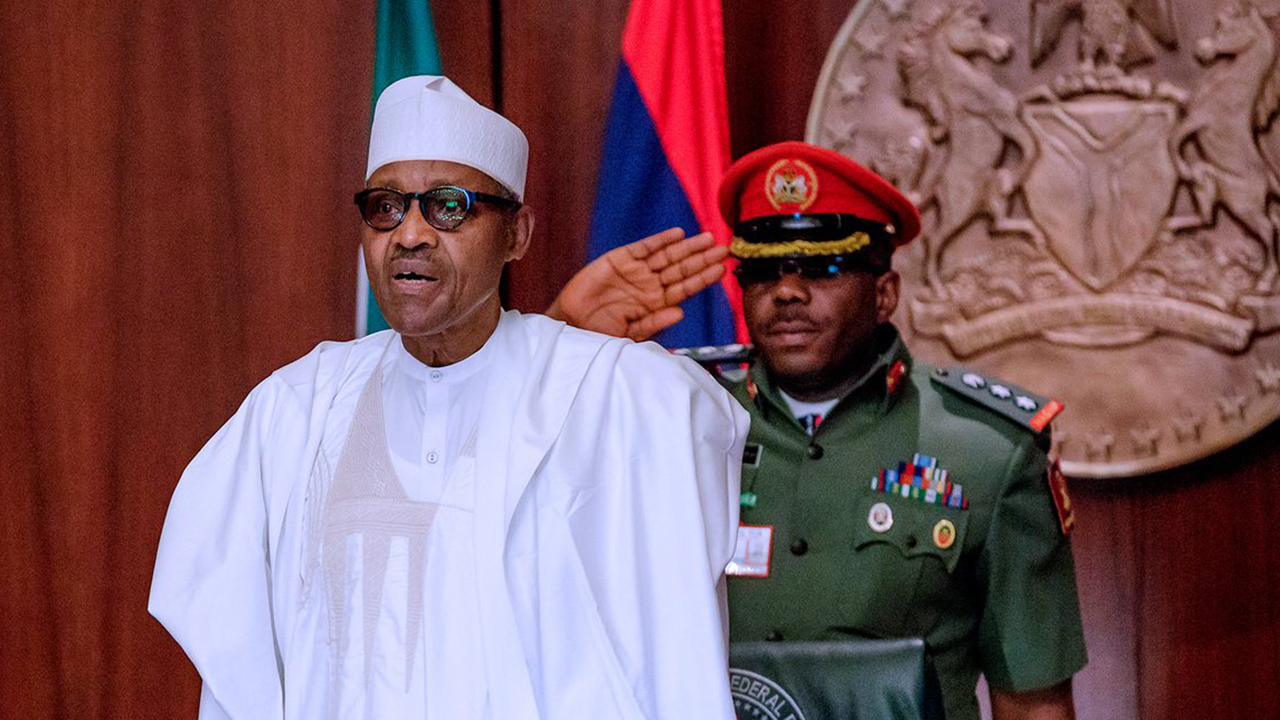
The DSS had, at the time, filed an ex-parte application seeking to keep the activist for 90 days to investigate him over his call for revolution through the #RevolutionNow protests. But Justice Taiwo approved 45-day detention, saying that the order was renewable after the expiration of the first 45 days.
With the detention order having elapsed on September 21 without renewal, and in view of DSS’s ex-parte motion earlier withdrawn, Taiwo ruled that there was no extant order for the activist’s continued detention.
The hint of what is to come had to be given when, for attempting to organise gatherings of thousands of Nigerians in Lagos, Abuja, and a handful other cities to make speeches about the country and government’s wrongs, the Buhari administration, through the DSS, filed a seven-count charge against Sowore and a co-accused, Olawale Bakare, bordering on treasonable felony, cyberstalking, fraud and insulting the president.
The government, through its prosecution lawyer, G. A. Agbadua had withdrawn an application seeking Sowore’s further detention, asking the court instead to “determine in the interest of national security” whether he ought to be released. Agbadua told the court that the allegations against Sowore attracted capital punishment.
Refuting Agbadua’s claim, however, Falana urged the court to take judicial notice that there was no legal basis for the detention of his client, adding that previous court decisions had allowed the bail of persons accused of treasonable felony, including the late MKO Abiola.
However, it is now over a day since Sowore’s release order was issued and with necessary conditions having been met by his counsels, he is yet to be released. Though it may still be early days, while Falana and his legal team contemplate their next line of action to get Sowore off the gulag, worries abound that the disposition of the Federal Government is not releasing the activist forthwith is, perhaps, a replay of the fate that had befallen other dissents before him.
With the stories of ex-National Security Adviser, Sambo Dasuki and leader of the Shiites Movement, Ibrahim El-Zakzaky for easy recall, the fear that the Buhari administration may just have chosen yet another court order to disobey is palpable.
Only on Monday, at a special session to mark the beginning of the 2019-2020 legal year, the Chief Justice of the Federation (CJN), Justice Tanko Muhammad, said that the judiciary, under his watch, would strongly uphold the tenets of the constitution as the supreme law of the land. At the event, which witnessed the swearing-in of 38 distinguished lawyers newly conferred with the honour of Senior Advocates of Nigeria (SAN), Muhammad said his administration would not tolerate the disobedience of binding court orders.
With the administration he represents having been accused severally of disobeying the courts and choosing which orders to obey, the CJN said the rule of law, which is the bastion of every democracy across the world, would be strictly observed.
Muhammad said, “The rule of law must be observed in all our dealings and we must impress it on the governments at all levels to actively toe the path. The right of every citizen against any form of oppression and impunity must be jealously guarded and protected with the legal tools at our disposal. All binding court orders must be obeyed. Nobody, irrespective of his or her position, will be allowed to toy with court judgments.”
He called on all to collectively show commitment to the enthronement of the rule of law in the country, stressing that flagrant disobedience of court orders or non-compliance with judicial orders is a direct invitation to anarchy in the society.
The CJN added: “Such acts are completely antithetical to the rule of law in a democratic environment. We must work together to make Nigeria one of the frontline countries that observe the rule of law and rights of the citizens in all ramifications.”
But if Malami’s open confession on the floor of the Senate while being screened, where he prioritised what he deemed public interest over human rights, is anything to go by, then Sowore, just like Dasuki and El-Zakzaky, may just be in for a long spell in detention.
Malami had admitted to the Senators, “I concede that I have a responsibility as AGF to protect individual rights but looking at the provisions of Section 174 of the constitution, I want to state further that the Office of the AGF is meant to protect public interest and where the individual interests conflicts with the public interest of 180 million Nigerians that are interested in having this country integrated must naturally prevail and I think that position has been stated by the apex court in the case of Asari Dokubo Vs Federal Republic of Nigeria that when an individual interest conflicts with public interest, the public interest will naturally prevail.”
In a case of elements of a whole working at cross-purposes at the close of work yesterday, Justice Taiwo’s immediate release order for Sowore had yet to be heeded.
Responding to inquiries by The Guardian late yesterday, Sowore’s lead counsel, Femi Falana, said the government was yet to let him off. “He has not been released. And they gave no explanations for the action. All they keep telling us is that we should give them time,” Falana said.
Should the government stick to its gun, questions as to who or which organ of government will take the administration to task on obeying the rule of law would keep ringing through.
Are there aspects of the Nigerian constitution that could be activated to force the hands of the Buhari government to do the needful? Is the National Assembly aware of such sections and is it ready to exploit such to force compliance? Should the lawmakers continue to feign ignorance or act complicit in the defiance playing out, what roles are there to play by right and civil society groups? Or would citizens’ action be the ultimate to checkmate the seeming rigidity of the Buhari-led administration?
[ad unit=2]



